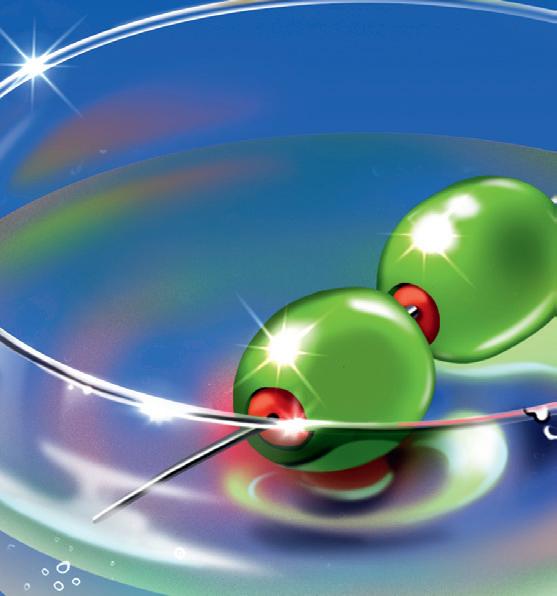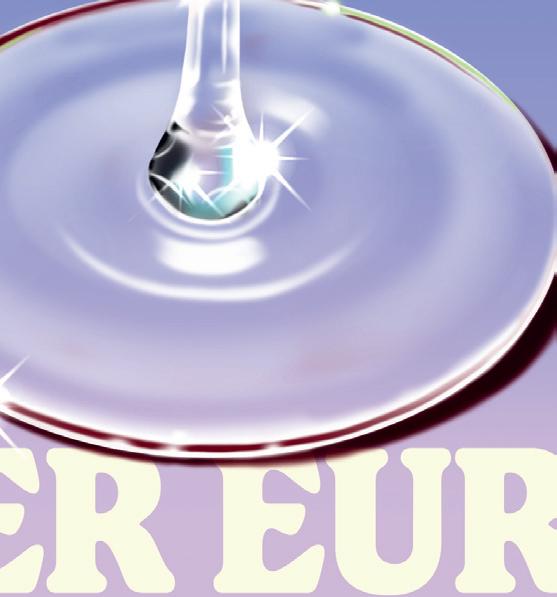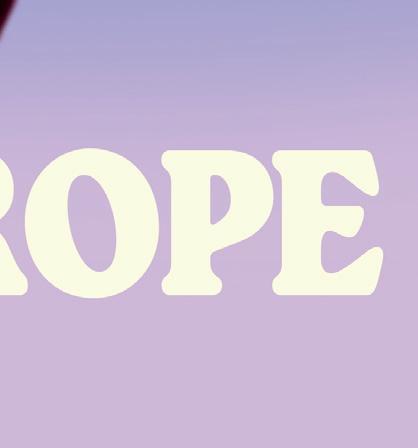






























ALSO BY NELL ZINK
UK | USA | Canada | Ireland | Australia India | New Zealand | South Africa
Viking is part of the Penguin Random House group of companies whose addresses can be found at global.penguinrandomhouse.com
Penguin Random House UK , One Embassy Gardens, 8 Viaduct Gardens, London SW 11 7BW penguin.co.uk
First published in the United States of America by Alfred A. Knopf, a division of Penguin Random House LLC 2025 First published in Great Britain by Viking 2025 001
Copyright © Nell Zink, 2025
The moral right of the author has been asserted
Penguin Random House values and supports copyright. Copyright fuels creativity, encourages diverse voices, promotes freedom of expression and supports a vibrant culture. Thank you for purchasing an authorized edition of this book and for respecting intellectual property laws by not reproducing, scanning or distributing any part of it by any means without permission. You are supporting authors and enabling Penguin Random House to continue to publish books for everyone. No part of this book may be used or reproduced in any manner for the purpose of training artificial intelligence technologies or systems. In accordance with Article 4(3) of the DSM Directive 2019/790, Penguin Random House expressly reserves this work from the text and data mining exception
Printed and bound in Great Britain by Clays Ltd, Elcograf S.p.A.
The authorized representative in the EEA is Penguin Random House Ireland, Morrison Chambers, 32 Nassau Street, Dublin D02 YH 68
A CIP catalogue record for this book is available from the British Library
ISBN: 978–0–241–74080–4
Penguin Random House is committed to a sustainable future for our business, our readers and our planet. This book is made from Forest Stewardship Council® certified paper.
I“It rained for forty days and forty nights,” Demian told his younger daughter, Maxima (“Maxi”), who had gone to bed early with a low-grade fever. It was sure to be something full-blown in the morning. He was German, but her mother was not, and since she went to a German school and spoke German with her friends, they had a family policy of speaking English at home. “The ice melted and melted, until it was all covered with water and floating on a lake that wasn’t supposed to be there. And all of a sudden, it slid right into the ocean. Platsch!” With both hands, he mimed a box sliding off a crooked shelf. “Imagine, a slab of ice the size of Greenland!”
She removed her thumb from her mouth and said, “How big is Greenland?”
He had no idea. It was notorious for being smaller than it looked on a Mercator projection, but he felt sure it was large, given that its melting would cause global sea levels to rise by something like seven meters. Ignoring her question, he continued the bespoke story about a tsunami hitting their building. “The ice fell into the ocean and made a wave so enormous, it went right across the North Atlantic to Norway.” He figured grafting on a little geographic instruction couldn’t hurt. “The giant wave went around Scotland and crossed the North Sea
from England to Holland, and then it went to Hamburg, and right up the Elbe for a hundred miles. When it got to the mouth of the Havel, it hit the brakes and made a sharp left turn. All the ducks in the marshes jumped in the air. Allez hop!” He gave a little jump, raising his torso a few inches from the mattress, and then collapsed again so she could continue twirling his hair. “It came up the Havel to Potsdam, and when it got to Wannsee, it made a right turn to the lake. And then it was at our house—a giant tsunami, all the way from Greenland!”
Looking satisfied, she said, “Mega.”
“Giselher and Almut”—those were their elderly landlords— “came upstairs to film it on their phones.” The counterfactual troubled him for a moment; the two hadn’t climbed the stairs in years. But that didn’t mean they couldn’t, given sufficient motivation.
“Were they dead?” She sounded hopeful.
Reluctant to pause the narrative to explain that death brings immobility and is a bad thing, particularly in this case (the heirs would quickly commandeer the whole house), he replied, “No. Nothing bad happened. The wave was tired out from going thousands of miles carrying debris.” Her look told him he needed to define debris. “It had dirt, and junk, and flotsam, and jetsam, and icebergs, and houses, and cars, and ferryboats, and fire trucks . . .” He paused, though he could see that she liked the list. He felt insufficiently driven to go on naming objects, because he was compulsively envisioning a parade of corpses, already bloated and bobbing on the surface as though they’d been dead for days. “By the time it got to Berlin, it was so tired, it was only two inches tall. It could barely move! It was primarily looking for a place to put things down.”
“Where did it put them down?”
“Siemensstadt.” He didn’t care to examine the perversity that made him name a working- class neighborhood. Low-lying areas near rivers were devoted to industry; it wasn’t his fault.
“Did it have trees?” She clearly wanted it to have trees, so he nodded. “What else did it have?”
“There were ants, and bales of hay, and chlorine, and dolls, and elephants, and friendships, and goats, and hills, and illnesses, and jaywalkers, and K- dramas”—his recitation slowed as self- doubt took the wheel, attempting to wrest control away from him by force—“and light poles, and money, and noodles, and options, and progress, and quagmires, and retrograde amnesia, and sanity, and trees, and the universe, and votive offerings, and whales, and xylophones, and yahoos, and zebras.”
He took her exhaled eee to be another request for trees. He started to answer, but saw that she had fallen asleep. Her eyes were open; she had been inadvertently hypnotized by the alphabetized list.
“Sleep now,” he said. She closed her eyes. Her mouth fell open and her hand released its grip on his bangs. He felt a burgeoning sense of parental pride in hearing her place value on trees, or any natural phenomenon for that matter, although at her age (four and a half) it could mean anything. Gently he rose, tiptoed down the hallway, and entered the parental suite—an office and bedroom connected by a boudoir with bath—to dress for the evening.
He selected his highest- quality, most conservative outfit—a blue three-piece woolen suit, bought in Munich, and a custom-made white shirt. The shirt had a Peter Pan collar. He was constantly getting compliments on his round- collared shirts and always told people exactly where he ordered them, from a little old lady in Słubice. He puzzled over his choice of tie. He did not want to be conspicuous, but he anticipated an eccentric crowd and felt that he should look slightly off-kilter, or at least not entirely like a banker.
He walked down the hall, tieless, his waistcoat and shirt collar open. In the kitchen, his wife, Harriet, sat at the table, eating a piece of apple sheet cake bought that afternoon and reading a long email on her phone. Her chin-length blond hair was pulled
back in a stubby ponytail. Apart from her Elsa- from- Frozen slippers (a gift from Maxi), she was dressed in black, down to her black socks and shawl. She looked up, setting her phone facedown on the table.
“Is Nicole back?” he asked. “I want to get her fashion advice.”
“She texted just now, saying she’ll be here by the time it gets dark.”
“When’s that?”
“Maybe another hour.”
It was Tuesday, February 21, 2023, and at 4:30 p.m. the sun’s dim glow was still backlighting the featureless sky above the Grunewald woods. The kitchen overlooked one of Berlin’s more pristine urban lakes, the Schlachtensee, from the second floor of their shared villa. By mid-April the view would be blocked by foliage. In the winter twilight, the black water could be seen to quiver with wind and suppressed rain.
“Too late,” he said. “What do you think, tie-wise—maybe the Hermès with the little leopards?”
“Nobody’s going to be looking at you,” she said. “It’s not a formal event. It’s rich people. Wear a patterned shirt, so people don’t think you’re with the catering.”
Demian returned to his room and mustered his alternatives. Eventually he kept on the white shirt and three-piece suit, adding a dark-blue tie and yellow socks. He presented himself again to Harriet, saying, “I’ll wear my new red sneakers. What do you think?”
“Cute.”
She wasn’t paying attention. He applied his right thumb to the back of his phone and stepped to the row of windows. The world outside looked sodden and stormy, but the weather app claimed all serious precipitation was over for the week. It might rain one or two liters per square meter. It occurred to him that shiny dress shoes might be easier to get mud off, if he happened to walk through mud. He didn’t consider the change in his footwear plan important enough to share with his wife, who was now
staring intently at a video conference, wearing noise- canceling headphones. By the time her workday ended, he would be sitting down to a gourmet dinner with their beautiful friend Livia. He didn’t feel guilty. The meal would be hard- earned by attendance at a literary-award ceremony.
He knew the award-winner well: an ageless (seventy- eight, with near-flawless skin because he seldom saw the sun) Arab (he had fled the Sinai for Norway at age eleven, but wrote with unabated, prolific intensity about his youth and had never attained literary competence in a second language) fabulist, first encountered on a Danish beach.
Demian had been youthful and impressionable then, sad and shy— eighteen years old and an avid reader of lyric poetry, including Arabic verse in translation. He listened to Masud’s flowery, halting English for days, unable to say no to his constant invitations. He was camping with as much luggage as would fit on his bicycle, and the writer and his wife had leased a house with a barbecue pit and wine cellar. With their permission, he pitched his tent in the yard. It made him feel rather Bedouin, as though he were meeting them halfway. Between meals, the man and the boy took long walks on the sandbank between the isle of Mandø and the coast, first reading the tide tables to make sure they wouldn’t be inundated. Masud’s wife cooked, but not particularly well. What else she did, he was never sure. When asked whether she liked walking on the beach, she drew up her veil to cover her nose, and he never asked again. She played the part of an absence with gusto, so he wasn’t too surprised when Masud turned up a year later in Brittany—they had arranged to meet over the summer again—with a different wife. Between meals, they took walks, and the woman did whatever. He never saw signs or heard tell of children, and wondered whether frequent divorces were being granted on grounds of infertility. Or impotence? Or were there oodles of children, now at home with their mothers? He wasn’t about to ask. Even at a stage when he could honestly claim to have listened
to Masud’s stories for 250 hours, he knew very little about his life. The writer enchanted him with the mystique of the desert while they wandered the wormy wastelands of the North Sea. Masud was celebrated as the literary voice of greater Arabia’s nomadic herdsmen—proud sons of the desert, a noble caste of unhurried sybarites not known for their religious orthodoxy. On reading the books, Demian discovered to his consternation a grating and persistent anti-Black racism. Was it excusable? He excused it, on grounds that it would be hard for an anti-Black racist to do much damage in Norway, where anti-Muslim racism was a deadly threat (admittedly much of it intersectional, directed against Somalis). Was it patronizing to suspend his ethical standards because the man was a genius, or Eurocentric not to suspend them, and which was worse?
He knew from experience that Harriet couldn’t sit still for that kind of bullshit or any other. She was a high-profile structural engineer, a hard-headed Ohioan from a long line of Mennonite builders, and awards— even (or especially) for architects—pissed her off. She worked on municipal contracts and couldn’t legally accept favors. His life was one big ring-around-the-rosy of favors: here a name mentioned to an award jury chair, there a set of keys to a disused beach house in Sardinia. People enjoyed him more than they enjoyed her, so he associated social events with pleasure. Low-maintenance, handsome, and earnest, he had a way of taking things and people seriously that flattered them all. His upbeat seriousness had gained him a position as an in- demand freelance art and architecture critic. No matter what cockamamie vision a deluded artist or bankrupt architect proposed, he could react with a pitch and a list of potential enablers. He felt certain that for every project in the world, however inane, there exists an organization of practically unlimited wealth that can be talked into financing it, and a curator willing to take the credit. His conviction drew on the observation that even the most megalomaniacally Instagrammable
art projects cost peanuts in comparison with the hobbies of elected officials and the superrich, who were certifiably insane.
He had adopted the earnestness during his first year at university, following a tip from a fellow student that if one participates and does the reading, time goes faster. Taking things and people seriously kept him a bit depressed—never bedridden-level, but in a state of unassuming, unpretentious melancholy that was evidenced in many things he did, such as turning a simple tsunami story for his daughter into a dark fable.
As a young art aficionado, he had sought out vicarious selfmortification and violence, seeing many performance artists, and even audiences, bleed and cry. Then he had met Harriet, a competent creative achiever. He intuited that if life is composed of violence, culture could offer an alternative; not a solution (Harriet was a problem-solver), but a moment’s respite, if nothing else. Still, his repressed love of violence made displays of symbolic power scintillate in his mind. He was one of the few critics to have visited the construction site of the desert utopia The Line, a city of the future that would cut through the mountains on the Red Sea coast of Saudi like a gigantic version of Heizer’s land-art piece Double Negative. He had witnessed the preparations for the first SpaceX launch in Boca Chica, and attended the dedication of the new presidential library in Ankara. It helped that his wife made real money, since The Line turned out to be a handful of bulldozer drivers living in tents, while the spaceport and presidential complex had been built in public parks; he found them impossible to praise in print. Occasionally he had visions of his own. For instance, he imagined a hyper- car, such as their neighbor’s annoying Lamborghini (only in Berlin were such things parked on the street!), at the bottom of a swimming pool filled with honey. The work would cost millions, because of the price of honey, and depending on where it was installed, the formerly loud car would sooner or later become invisible under an opaque layer of dead bugs.
He told no one about his art ideas. They came from a place deep within him that was ruled by his inner child. That child, which knew nothing about art or other uses of freedom but craved love and acceptance in exchange for its aggression and hate, worried that people would laugh at its ideas and steal them. Conversely, the adult Demian— openly admiring of the many gifted artists he knew, openly skeptical of blowhards, at ease with his status as a decorative hanger- on—thought the child’s ideas were lame.
IIHis daughter Nicole, age fifteen, maneuvered carefully between a column of parked cars and a column of those not yet parked. She made eye contact with yet another driver, and again he shook his head. She had been displaying herself for an entire eight minutes, but no one had stopped for her. On the contrary, whenever she approached a passenger-side window, the driver touched the gas pedal, pulling up as close to the car in front as possible, his face impassive or even hostile.
She wore a calf-length dress and an expression of agony. The damp of the oncoming night seemed to be attacking from all directions, frizzing her hair, mussing her makeup, making her outfit cling like latex. She heard her phone ding. For a moment she ignored it. She felt faintly that she should have turned it off, because people might spy on her. Then she reconsidered, and turned, head down, to read a text from her mother in the narrow defile between two SUVs. “Back by dark,” she replied.
She stashed the phone and looked up. A man on the sidewalk was facing her directly, looking interested. Squat and bald, he wore droopy slacks and an ugly nylon bomber jacket that mushroomed around his belly. It was her first promising contact since her quest to play at turning tricks had begun, ten minutes before.
She grinned, producing again the involuntary look of anguish, her eyes glistening with fear.
“Fuck out of my space!” the man said. “Way, away now! Move on!” A grayish-skinned, round-faced maiden in unseasonably kneefree skinny jeans joined in from the other side of the street to share similar sentiments. Another young woman, in a fuzzy white miniskirt that matched her strawlike hair, with an uneven spray tan in place of stockings, emerged from behind a panel truck and commenced marching stiffly toward Nicole, offering to cut her face.
The three unfriendly people bumped her nerves to a higher phase of excitement, so she did the sensible thing and walked into traffic. The driver whose way she blocked had just accelerated. As he braked, he glared, but she paid him no mind, leaning briefly on his hood to leave a distinct palm print in cold sweat—a neat outline of her hand, lined in transparent droplets. “Schwuchtel!” he shouted. (“Faggot!”) She turned left around the car to walk shakily westward on Kurfürstenstrasse, head high, eyes frantic with terror. It was hard for anyone— especially her—to say what in hell she thought she was doing. The logic that had brought her there was easily articulated. She needed honest answers. She had asked a few friends whether she could pass. Of course their “Yes!” was immediate and unqualified. They had said this even at the stage when her fashion experiments had been limited to scoop-necked T-shirts and sandals with narrower straps. Her parents were likewise one-hundred-percent affirmative. Everyone flattered, cosseted, and coddled her. It made no sense. Because whenever she looked in the mirror, she experienced body dysphoria. That was the point! She wasn’t okay, much less beautiful! That’s why she needed her parents to step up and let her have puberty blockers before she got any older!
But would it even work? Would she ever be beautiful? Who would tell her the truth about her face, her hands, her ankles—her bones?
The obvious answer: total strangers. Strangers who were also kind of assholes. Straight men.
But not, like, men in some dark bar who would follow her outside to beat her up. She wanted spontaneous reactions from card- carrying ladies’ men in a busy public place where she felt safe. Obviously nothing could be simpler than posing as a streetwalker on Kurfürstenstrasse for a few minutes.
At least that’s what she had thought—that it would be easy.
Envisioning the situation had posed no challenge. A sashay down the catwalk, with a point for each wolf whistle. But she had gravely misjudged how it would make her feel.
She had put on a stretchy, glittery black dress, a polyester knit with silver metallic threads and a sequinned neckline, the kind of thing that gets produced by the thousands for New Year’s Eve and thrown away rather than washed. She had bought it at a department store (a friendly one, where they let anybody try on anything and carried women’s shoes in size forty-three) a month before, marked down by eighty percent. The boots were her first- ever high heels— not cheap, but due to her inexperience, the metal-reinforced kind whose heel strikes on concrete ring like a bell, soled with slick, hard leather.
She had bought the things because Harriet owned neither a dress nor a pair of high-heeled shoes. She had gone through her mother’s underwear drawer to find, not the hoped-for stash of sexy lingerie, but a disordered mass of sports bras and all- cotton granny panties in the same drab black as the rest of her clothing. Her medicine cabinet was devoid of makeup, cosmetics, and perfume, because she washed her face in the shower with diluted hand soap. The two had exchanged harsh words, with Harriet—who had broken free of a sect that enforced long dresses and white bonnets to spend her life achieving dominance in a male- dominated field— expressing disdain for the idea that becoming a woman might entail adjustments to a person’s behavior. She was the opposite of
a TERF, in a way that drove her daughter straight up the wall: she accepted their shared femaleness on its face, with the bored shrug of the unfazed.
Some friends argued that her mom was autistic, while others thought she was pathetic—a repressed trans man, in self-hating denial. But Nicole knew that if it had been up to Harriet, she could have started hormone therapy the year before. All the blame for her delayed transition lay with her dad. She’d have the beginnings of breasts by now, instead of a clammy set of sticky falsies that pushup bras turned into a warped and jutting debacle. For months now, she had gone braless in protest, concentrating on modulating her voice and movements and building up her glutes.
She had practiced walking at home, all around the large apartment, and up and down the stairwell, and she had thought she was getting pretty good. But the street’s surface was uneven, the asphalt arranged in subtle waves and marred with spot repairs. The distance was orders of magnitude beyond anything she had tried at home. Her toes throbbed and her calf muscles ached. She moved to the sidewalk. The street was still jam-packed with cars. She sought the drivers’ eyes, but they looked away. She realized that they might be searching not for the warmth of human companionship, but for parking.
At some point—for her, indefinable—she left the red-light district. If no one was working a given street, did that make its territory available, or irrelevant?
If nothing else, she decided, her misadventure might retroactively be cleansed of mortification if she framed it as getting practice walking in the boots. She decided to walk the length of Kurfürstenstrasse and board the S7 at Bahnhof Zoo. Among other things, she needed to unload a heavy burden of physical energy. The idea of being seen by crowds of commuters at the train station made her twang with half- ecstatic ambivalence. Cross- dressing was like a dish of fried brains to a starving vegetarian. It was not what
she needed. But it had something undeniably to do with what she needed.
Not so long ago, her identity quest had lacked a tangible goal. It had veered around inside her brain, emerging unbidden at intervals, sudden and searing as a solar flare. Euphoria alternated with self-hatred drenched in tears, and a playful erotic what-if with visceral revulsion. She looked at women and girls searchingly, desperate for answers. Were they performances, were they female flesh, was there anything worse than female flesh when it stopped performing? She looked at men and boys surreptitiously, fearing to be misunderstood. She had plucked her brows, shaved her legs, and the next morning faked a fever so she could stay home from school. She had applied pink nail polish and scrubbed it off with acetone. But the mandate to transition socially was clear. A person couldn’t hang back, sort things out, and suddenly get gender-affirming hormones and surgery on demand; to get her body rectified, she had to put in her time. She worried that she was still male in her sleep. Her therapist assured her that morning wood had a function for growing girls as an inner dilator, taking their future neo-vaginas to a serviceable size. It wasn’t confusing to her in the least, once she accepted inside- out dilation as a metaphor for her whole life.
As she moved westward, the street widened into a boulevard. Few pedestrians remained, for which she was grateful. Inside her too-tight gaff from an online shop, her balls itched. She wasn’t having an out- of-body experience—it was more like the opposite— but still she was struggling to maintain her own perspective, a view of the world through her own eyes. She felt looked-at and hollowed- out. In her party dress and scarlet bee-stung mouth on a Tuesday afternoon, she was coming to feel that outfits designed to draw attention might be better confined to situations where distractions were plentiful and attention was hard to come by, such as nightclubs. The scenery consisted of gray concrete sidewalks with granite curbs bordering asphalt in a darker gray, gray trees streaked
with black, and façades the color of ashes. Her sensitive, suffering flesh with its chafed red highlights was like a gaping wound that had heaved to its pointy feet and was lurching around. Her face was a portal leaking anguish to an inanimate world, and with every step, her dress ratcheted upward, climbing her tights like a lumberjack. The dress wasn’t lined, and she hadn’t thought— or even known—to wear a full slip. It was rising steadily, yet the crotch of her tights would soon reach her knees. The public catastrophe was near complete.
Staring downward like a child trying not to step on the cracks, she fumbled through multiple layers of fabric. She stopped and turned to face away from the wind. After yet another cursory, futile yank on her underwear, she realized that she was freezing. She surrendered and buttoned up her woolen overcoat, hiding the dress. It was the longest coat she owned—an oversize leftover from last year, in navy-blue tweed, with raglan sleeves and her deadname written in black marker on the pale-blue lining of the collar. Fumbling under the shelter it provided, she pulled her hem up to her waist, rearranged her undies, and fixed her stockings. There was nothing discreet about any of it. She was, she decided, authentically a hot mess. She wished her friends could see her. She pulled out her phone, flashing a coquettish V-for-Victory sign as she took a quick series of selfies that she deleted frowning, shoulders hunched. She did a full 360- degree turn to see whether anyone had watched her. Again she saw a man she had noticed blocks before.
Either he was strolling innocently up Kurfürstenstrasse to the Zoo railroad station at a similar pace, or he was following her and staring; she wasn’t sure. He wore a maroon fleece under a black windbreaker, with jeans and sneakers. His hair was salt-and-pepper, in a brush cut, his eyes obscured by the horizontal bars of boxy sunglasses, his mouth by a bristly mustache.
She took a few steps, stopped, and glanced back to see him turn toward a shop window, which he examined intently. Having just passed the shop, she knew it was a car rental—not the kind of